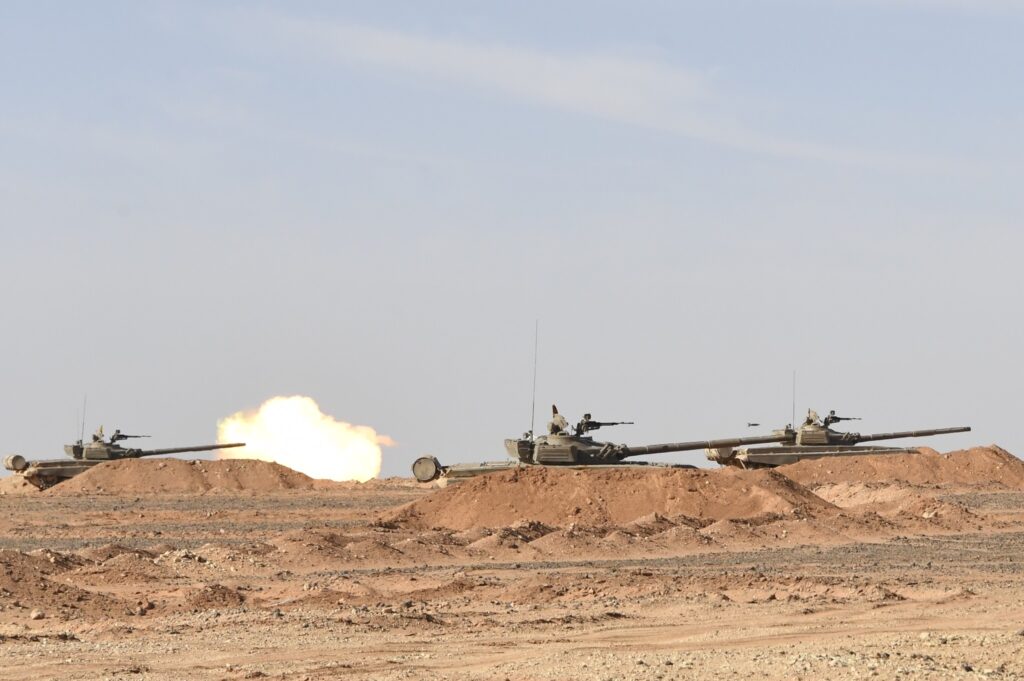With a significant rise in defense spending, Algeria is moving to modernize and expand the capacity of its People’s National Army. New acquisitions are bolstering its ground forces, air force and naval assets, and enhancing its intelligence and technological capabilities.
Since 2023, Algeria’s military budget has risen by more than $2 billion annually. In 2024, it spent $21.6 billion. This year, it reached a record $25 billion. The official reason is homeland security. But seen through the prism of its historical rivalry, the buildup is a concern to neighboring Morocco.
“Its status among the top 40 global military spenders is seen domestically as a strategic achievement,” Geopolitical Intelligence Services (GIS) wrote in a March 5 report. “By the late 2030s, Algeria plans to enhance its satellite network for both civilian and military applications, reflecting a broader strategy to strengthen its technological independence and strategic capabilities.”
Driven by regional security concerns that include terrorist groups and organized crime trafficking rings, Algeria’s actions nonetheless impact Morocco, where reports of the construction of an Algerian military airstrip near Béchar stoked worries about a military buildup near the border. An analyst with ties to Morocco’s Royal Armed Forces, however, tried to tamp down the concerns of his countrymen.
“Algeria is a sovereign country. It builds what it wants on its soil, as long as it poses no direct threat to Morocco,” he told The Africa Report news website. “These airstrips are far enough away not to be seen as hostile.”
The analyst said that while the number of Algerian military installations along the border with his country has tripled in 15 years, it is part of a broader trend. Algeria also has expanded its military presence along its borders with Libya, Mali, Niger and Tunisia. Since it achieved independence in 1962 and fought against Morocco in the 1963 Sand War over the countries’ border lines, Algeria has had fraught relations with its neighbor to the west. Today, those tensions remain high as both nations escalate arms acquisitions that impact the greater Maghreb.
“Algeria currently maintains a stance of rhetorical confrontation with its neighbor, underpinned by substantial investments in military capabilities, while deliberately steering clear of red lines that could provoke open conflict,” the GIS wrote, adding that the arms race with Morocco is openly embraced by Algiers.
“The Algerian regime derives internal legitimacy by positioning itself as the sole actor capable of counterbalancing Moroccan influence.”
Djenabou Cissé, a specialist in strategic and security dynamics in Africa, said both countries have sought roles in the Sahel, now thought to be the worldwide epicenter of terrorism.
“The Algerian-Moroccan rivalry has shaped the positions and commitments of both countries in the Sahel region,” he told The Africa Report.
Algeria has increasingly isolated itself by taking unfriendly stances with its neighbors. To the east, Algeria keeps watch on Field Marshal Khalifa Haftar, whose Libyan National Army in August 2024 pushed toward the Ghadames airstrip, just 10 kilometers from Algeria’s border.
To the south, it deployed troops along its border with Mali to guard against infiltration by heavily armed extremist groups. Tensions ratcheted up further on April 1, when the Algerian Army shot down a Malian drone near the border. Both countries insisted the drone had been operating within its territory.
The alliance of junta-led governments of Burkina Faso, Mali and Niger withdrew their ambassadors to Algeria, and Algeria retaliated, withdrawing its ambassadors.
Across southern Algeria, in places like Bordj Badji Mokhtar, Djanet, In Guezzam and Tamanrasset, the country has spent tens of billions of dollars on air bases, defense systems and surveillance tech. But, as ever, Algeria has Morocco in mind as it maneuvers diplomatically and militarily. The GIS report warned that “by excessively arming its forces and adopting a confrontational stance toward its neighbors, Algiers inadvertently creates the conditions for a spark that could ignite conflict.”
However, it stressed that the chances of a direct military confrontation with Morocco are low, as neither side of the Maghreb rivalry would stand to gain from such a conflict.
“The Algerian regime will most likely persist in its strategy of acquiring modern weaponry, regularly showcasing its military capabilities,” the GIS said. “Despite the assertive positioning, the country’s leadership appears more preoccupied with consolidating its legacy than preparing for active military engagement.”

